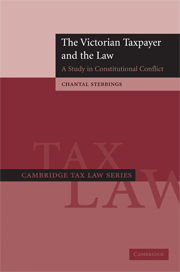Book contents
- Frontmatter
- Contents
- Acknowledgements
- Table of Statutes
- Table of Cases
- List of Abbreviations
- 1 The establishment of the taxpayer's safeguards in English law
- 2 The taxpayer's constitutional safeguards of Parliament
- 3 The administrative safeguard of localism
- 4 Judicial safeguards
- 5 The taxpayer's access to the safeguards
- 6 The taxpayer, the constitution and consent
- Index
5 - The taxpayer's access to the safeguards
Published online by Cambridge University Press: 08 August 2009
- Frontmatter
- Contents
- Acknowledgements
- Table of Statutes
- Table of Cases
- List of Abbreviations
- 1 The establishment of the taxpayer's safeguards in English law
- 2 The taxpayer's constitutional safeguards of Parliament
- 3 The administrative safeguard of localism
- 4 Judicial safeguards
- 5 The taxpayer's access to the safeguards
- 6 The taxpayer, the constitution and consent
- Index
Summary
Introduction
The taxpayer's three principal legal safeguards of Parliament, the local administrative process and the judiciary were as much dependent for their efficacy on the taxpayer's ability to access them in 1837 as they had been in the previous two hundred years. In direct taxation, where the fundamental voluntaryism of customs and excise was absent, access to the safeguards was of prime importance. Access comprised a knowledge and understanding of the duties which tax law and practice imposed on the taxpayer, and of the appellate bodies permitted by the law, as well as the affordability of recourse to the latter. It also encompassed the availability of expert advice to make the best possible use of the legal safeguards. Only then could the taxpayers' constitutional right to pay only the tax they had consented to through Parliament effectively be safeguarded.
Educated taxpayers in the nineteenth century could learn a great deal about the taxes applicable to them and the passage of any new tax laws through Parliament, through readily available sources. The debates of the House of Commons were published, and the numerous Select Committee reports, and those of Royal Commissions, were printed and could be purchased by the public at a relatively low price from the beginning of Victoria's reign, as well as often being available in local public libraries.
- Type
- Chapter
- Information
- The Victorian Taxpayer and the LawA Study in Constitutional Conflict, pp. 146 - 176Publisher: Cambridge University PressPrint publication year: 2009



